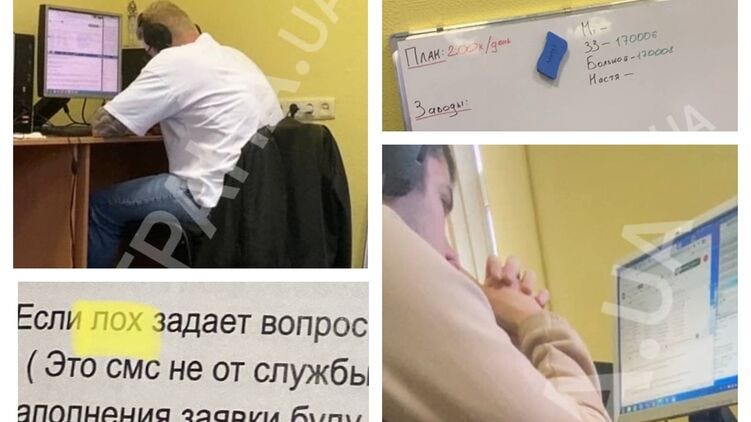Welcome to the Office
Scam call centers part 2. The criminal capital of Europe. Programmed to Steal
Last time, we dipped our feet into the dark world of the call center. Today, we are heading to what its residents proudly call the criminal capital of Europe:
Dnepr (formerly Dnepropetrovsk)
When most people think of Ukraine, they think of revolutionary Kyiv, or nationalist Lviv, or grim Donetsk. But if you want to understand the Ukrainian power elite, then you need to look at the eastern city of Dnepr. The revolutions, wars, and political struggles of post-Soviet Ukraine were all essentially a struggle between the economic elites of the Donbass and Dnepr.
The Donbass elites, exemplified by figures like Rinat Akhmetov or Yanukovych, wanted to buy all of Ukraine and turn it into a vast monopolistic concern. The Dnepr elites wanted to buy all of Ukraine and resell it at a profit to unsuspecting victims.
Dnepr was where Ukraine’s first president came from, Leonid Kuchma, the man who made modern Ukraine, who organized the creation and stabilization of the oligarch class.
Dnepr was where the ‘gas princess’ Yuliiya Tymoshenko came from, who ran Ukraine’s first modern, western-style political campaigns, and Ukraine’s first real political advertisements. It was she who, throughout the 2000s, played the role of proto-Navalny western darling warrior for justice - with the difference that she was one of the country’s biggest oligarchs and politicians, and her entire fortune depended on Russian gas. She, by the way, banned casinos during her time as prime minister.


Of course, Dnepr is the homeland of Igor Kolomoisky, the oligarch who played such a crucial role in the 2004 Orange Revolution and the 2014 Euromaidan. I have written about him in great detail, here, here, and here. The self-declared ‘yido-Banderite’ people love to hate so much, that at the end of the day he might just be lovable.
His self-consciously mafiosi behavior, his cynical jokes, endless swearing and trademark cackling laughter have spawned countless memes. In his famous showdown with Radio Free Europe journalists shown below, he invited his opponent to coffee and asked ‘is your tongue shoved inside your arse or what?’
And, well, how without it - Dnepr is also the homeplace of Volodymyr Zelensky. He was born in the city of Krivoy Rog, which is in the boundaries of the Dnepr region. And it was Kolomoisky’s patronage that propelled Zelensky from the world of show business to that of politics - not that there was much of a difference.
Dnepr always had an air of mystery, conspiracy, and violence. It became something approximating a city in the 17th century, set up, like Zaporizhye, as a fortified outpost against Turk and Tartar onslaughts. This was the so-called wild field, where Cossacks - 17th century semi-nomadic paramilitaries - plied their trade as robbers and mercenaries.

In the Soviet era, it was a secret city. Its military factories, especially the famous Yuzhmash (which future president Kuchma was in charge of) produced top secret Soviet rockets and other cold war wunderwaffens. As a result, foreigners were forbidden access to the city until the destruction of the Soviet project. With the factories crumbling, and predators like Kolomoisky selling them off for scrap metal amidst hails of bullets, the city began a new life.
The Offices
‘Office’ is what scam call centers are called in Ukraine, and their capital is Dnepr. They mainly (or at least claim to) prey on Russians. According to the major Russian bank Sberbank in 2021, telephone scammers - most of whom are in Ukraine - steal 5 billion roubles from Russians a month. A representative of the bank told strana.ua that the average successful scam call brings in 8 thousand roubles, with each call centre conducting 3-7 thousand calls a day. Each month, Russian authorities detect 300 thousand scam calls.
I took the time to listen to some Ukrainian hustle-grindset bitcoin bros who boast about how Dnepr is the criminal capital of Europe. They put out a long interview with a masked man about his experience working at an Office in Dnepr. This is what I found out.
Mainly, acquaintances and their friends go to work there. There are plenty of ads for it in the buses in Dnepr, but that’s mainly low-level, totally criminal enterprises. If you work there, ‘unpredictable consequences’ can occur, he said. If you work at a low-level criminal enterprise and you earn well, you might find it impossible to leave the company.
While his fellow bitcoin bro asked him several times about whether it is possible to set up one’s own office, he advised against it. You need to have connections, either police or organized crime, because otherwise you will have to constantly move your office to avoid raids.
Now, as for how the scams work. Often, one person calls as a policeman to say that someone else has used your card. Then they forward you to a ‘banking expert’, who asks you to withdraw some cash or enter credit to verify it is you. They use bases of data which can be bought online to make it more believable. Various facts about the person being called are mentioned.
To get these facts, Offices have access to enormous databases. According to a strana.ua investigation in 2021, 12 large-scale platforms for the purchase of personal details in Russia exist. The Offices are so professional that they also use a variety of software which allows them to call their victims using the phone line of Russian police and banks.
Hello! You are being contacted by a technical employee of the department (Sberbank), junior specialist Anatoly Volkonksy. I am reaching out to you regarding the following issue. Two minutes ago, a request was submitted to change your financial number. Do you confirm this request?
So it begins, and if you’re smart enough, so it ends.
The Offices call their victims ‘lokhs’ - the prison jargon for stupid civilians whose fate is to be tricked and exploited. According to one of the people the strana.ua investigation talked with, on average out of 300 calls a day, 5-7 lokhs ‘they take the bait’.
The strana.ua journalist managed to pretend to be a prospective Office worker for a day, until he was found out and threateningly pushed out by someone who recognized him as a reporter. One wonders whether the law enforcement ‘roof’ (racketeer) of the Office let them know that a treasonous anti-NATO reporter was at their business).
The journalist managed to take photos of the signs across the Office he infiltrated in Kyiv, instructing employees how to best work the lokhs, as well as the daily target - 200 thousand hryvnias (all written in Russian, naturally).
Ominously, the former Office worker interviewed by the bitcoin bro noted how his former workplace also uses totally pliant individuals which they have in Russian cities. They can pretend to be bank officials which come to ‘help’ the victims at the ATM, creating the illusion of a real bank. These are people who have been ‘psychologically broken’ because all their money and property has been stolen by the Office. Humiliated and broke, they follow any command from their tormentors.
I am reminded of the various cases of school and other shootings in Russia recently, where those responsible claim to have been corresponding with people in Ukraine online. This is particularly relevant given the fact that Ukrainian Secret Services and nationalists (the two are inseparable themselves) are at the top of the Office pyramid. On which more in the next installment.
Anyway, the bitcoin bro boasts that sometimes the offices can get their victims to sell entire apartments, houses and cars to cover the debts. The gentleman in the mask notes that 70% of those scammed are women, though he forgot to say how old they are. Of course, the Office veteran says it’s all justifiable and they should get government awards because they are defeating Russians.
The man interviewed was proud of how ‘we are fighting their army using money they sent us’. He claims his boss gave 20% of his income to the AFU and personally went to give his car to fighters at the frontline.
The scammers themselves also get handsome dividends. The callers get 9% from each deal (according to the 2021 strana.ua investigation, 7.5%). The hero of the video I watched often earned 30-40 thousand hryvnia a week, 160 thousand a month. For comparison, most people in Ukraine nowadays are lucky to earn 20-30 thousand a month.
Office World
In the next installment, we’ll have a look at the rightwing paramilitaries and government officials who control the Offices, and the wartime turf wars over control of this lucrative market.
To end, I’d like to dwell on the deeper meaning of the Office. As I said at the start, the 2014 Euromaidan was a victory of the Dnepr oligarchic clan, personified by Igor Kolomoisky.
It was Kolomoisky’s business logic - the Dnepr way - that took over Ukraine. Where the ultimate goal was not to build or at least conserve factories, but to wring out everything possible and sell to an unsuspecting idiot. Or to put it in Office language - ‘to hook the lokhs’. Where reality became less important than marketing deadly lies. It’s no coincidence that political advertising was born in Dnepr.









Ι can see how the Dnepr oligarchs and the liberal nationalist NGOs got along so well during their momentary alliance in 2014. 'Lokh' and 'Bydlo' seem to convey the same type of elite disgust towards whoever is unfortunate enough to be on the receiving end. Those call centres really are the Oligarch goon version of whatever PR idealist non-sense an NGO sells in Ukraine, but more self-aware.
Dnepr is a fascinating case; a deeply industrial, proletarian city like Kharkov/Kharkiv and Donetsk, but its local goons went on a completely different economic trajectory. I guess it's either the nature of the privatizations in the region or the inflated egos of the intelligentsia/nomenklatura which (I assume) benefited from primitive accumulation in the 1990s.
My question is; is the clan still around and are they backing a particular faction in the unfolding struggles mentioned in your previous articles? Or did they get destroyed like their Donetsk brethren?